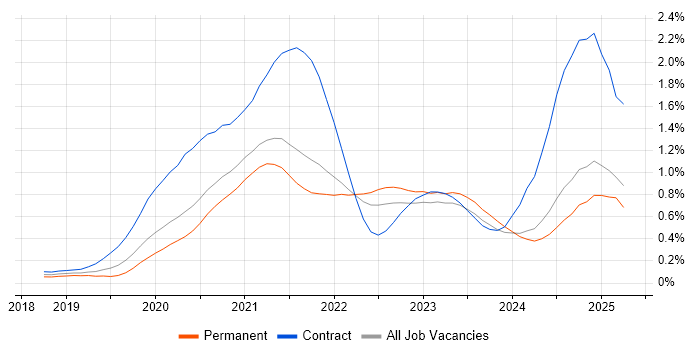Databricks
England > Yorkshire
The table below provides summary statistics for permanent job vacancies advertised in Yorkshire requiring knowledge or experience of Databricks products and/or services. It includes a benchmarking guide to the annual salaries offered in vacancies that cited Databricks over the 6 months leading up to 5 March 2026, comparing them to the same period in the previous two years.
The figures below represent the IT labour market in general and are not representative of salaries within Databricks.
| 6 months to 5 Mar 2026 |
Same period 2025 | Same period 2024 | |
|---|---|---|---|
| Rank | 157 | 125 | 174 |
| Rank change year-on-year | -32 | +49 | +67 |
| Permanent jobs citing Databricks | 24 | 19 | 22 |
| As % of all permanent jobs in Yorkshire | 0.55% | 0.79% | 0.47% |
| As % of the Vendors category | 1.64% | 2.61% | 1.23% |
| Number of salaries quoted | 16 | 16 | 18 |
| 10th Percentile | £35,625 | £43,750 | £45,625 |
| 25th Percentile | £47,000 | £51,125 | £58,750 |
| Median annual salary (50th Percentile) | £70,750 | £65,000 | £80,000 |
| Median % change year-on-year | +8.85% | -18.75% | - |
| 75th Percentile | £85,625 | £70,125 | £87,500 |
| 90th Percentile | £92,500 | £79,375 | - |
| England median annual salary | £83,250 | £75,000 | £80,000 |
| % change year-on-year | +11.00% | -6.25% | +6.67% |
All Vendors
Yorkshire
Databricks falls under the Vendor Products and Services category. For comparison with the information above, the following table provides summary statistics for all permanent job vacancies requiring knowledge or experience of all vendor products and services in Yorkshire.
| Permanent vacancies with a requirement for knowledge or experience of vendor products and services | 1,467 | 727 | 1,784 |
| As % of all permanent jobs advertised in Yorkshire | 33.35% | 30.35% | 38.10% |
| Number of salaries quoted | 683 | 430 | 1,356 |
| 10th Percentile | £26,000 | £26,250 | £26,250 |
| 25th Percentile | £28,250 | £33,281 | £31,500 |
| Median annual salary (50th Percentile) | £40,000 | £45,000 | £47,500 |
| Median % change year-on-year | -11.11% | -5.26% | -5.00% |
| 75th Percentile | £58,125 | £64,688 | £63,750 |
| 90th Percentile | £77,485 | £80,000 | £79,375 |
| England median annual salary | £52,500 | £57,500 | £50,000 |
| % change year-on-year | -8.70% | +15.00% | -13.04% |
Databricks
Job Vacancy Trend in Yorkshire
Historical trend showing the proportion of permanent IT job postings citing Databricks relative to all permanent IT jobs advertised in Yorkshire.

Databricks
Salary Trend in Yorkshire
Salary distribution trend for jobs in Yorkshire citing Databricks.

Databricks
Salary Histogram in Yorkshire
Salary distribution for jobs citing Databricks in Yorkshire over the 6 months to 5 March 2026.
Databricks
Job Locations in Yorkshire
The table below looks at the demand and provides a guide to the median salaries quoted in IT jobs citing Databricks within the Yorkshire region over the 6 months to 5 March 2026. The 'Rank Change' column provides an indication of the change in demand within each location based on the same 6 month period last year.
| Location | Rank Change on Same Period Last Year |
Matching Permanent IT Job Ads |
Median Salary Past 6 Months |
Median Salary % Change on Same Period Last Year |
Live Jobs |
|---|---|---|---|---|---|
| West Yorkshire | -20 | 21 | £79,000 | +21.54% | 17 |
| South Yorkshire | -30 | 1 | £45,000 | -30.77% | 3 |
| Databricks England |
|||||
Databricks
Co-Occurring Skills & Capabilities in Yorkshire by Category
The following tables expand on the one above by listing co-occurrences grouped by category. They cover the same employment type, locality and period, with up to 20 co-occurrences shown in each category:
